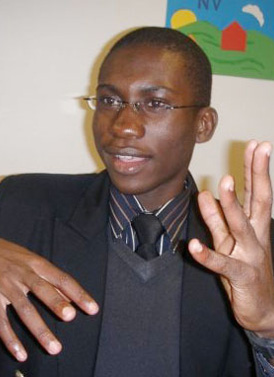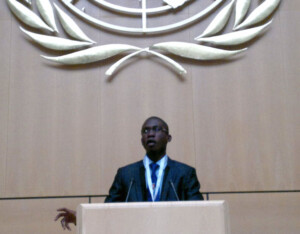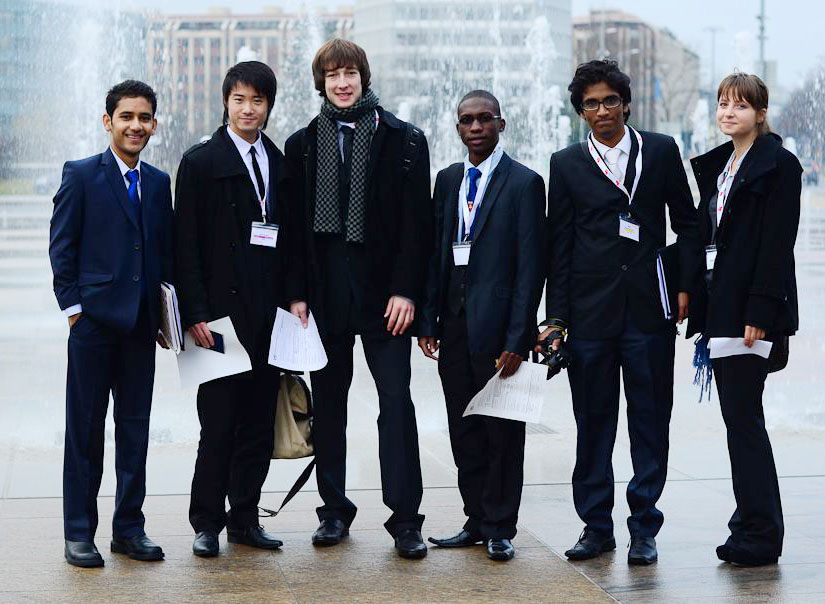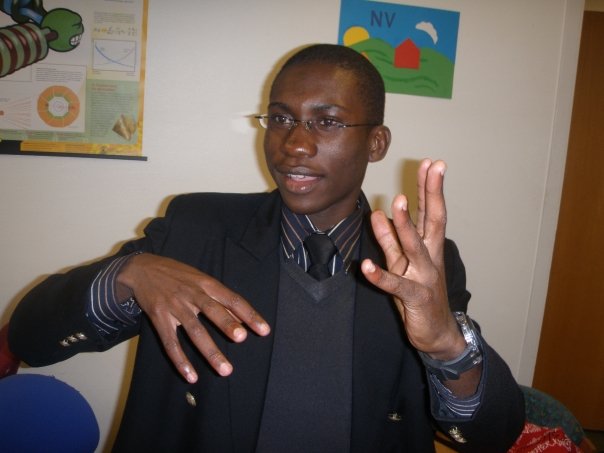by admin
Share
by admin
Share

Kashindi:
Welcome Gawie, please introduce yourself to Namambe?
I was born in a residential townhouse in the town of Oshakati on 4th August 1991. Since then I have been domiciled in Ongwediva and Oshakati, but my home has always been the small village of Oupumako a few kilometres east of Ongwediva. Those who do not know me usually categorise me as an academic, although I possess a few qualities of an academic, my personality is very far from one. Since preschool, I have been an average performing learner, only getting an A in arts and crafts. It was only when I went to junior high that I started performing. I attended Erundu Combined School till my grade 10 and later moved to Etosha Secondary School in Tsumeb.
Since childhood, I have always loved to draw, to this day, when I have time, I draw sketches and comics. A hopeless hobby for me I think, because I do not use it anywhere. My mind thinks in “pictures” and analytical links. My mind is logical, innovative and creative in thinking. I can become very excited about theories and ideas. I am exceptionally capable and driven to turn theories into clear understandings and practical outcomes. Academically, I am highly analytical and draw connections between concepts to understand them in a holistic manner; I work best when allowed to use my imagination. I think I would have loved being a graphic designer or anything in the field of marketing. I also always had a passion for singing; I have been in choirs for as long as I can remember, I even use to perform at school talent shows some time in the past. And I used to love sprinting, I use to run 100m and 200m in school, it was my forte.
1. What are you doing this year?
I have completed my first degree, Baccalaureus Juris and I am currently doing my second law degree at the University of Namibia, Bachelors of Laws. After my bachelor’s degree, I will be going abroad to do my Masters in International Maritime Laws.
2. How many languages do you speak?
Well, this has always been a very funny topic for me and my friends, especially because of my name. I have been speaking Oshiwambo all my life, I am from a village in Owamboland so I can inherently speak the language. Since I started my formal education, I have been studying English, so I can speak English fluently. Then came Afrikaans, since I started kindergarten I have been studying Afrikaans. I have never failed it, at oral presentations and listening tests I would nail it, and I would perform relatively well in the subject. But the moment I just step out if the Afrikaans class, my brain just stores the language deep in some unreachable compartment in my brain. I thought I was just horrible at languages so while in the north, I attended a 3 months Russian training course. I did well there and I can still remember what I have learned (although not a lot). I still want to test my language learning skills with French, Mandarin, Portuguese and two other African languages.
3. You have been taking part in debating, how many countries have you travelled to because of this important skill?
Sweden, The Netherlands, South Africa, Belgium, Germany, Canada, France, Switzerland, China, Bulgaria, Turkey, Botswana, United Arab Emirates, Mozambique and The United Kingdom. In some I have stayed longer and some only for a few days for special conferences and meetings.
4. Who is your role model?
In answering this question, I would like to confine it to several definitions and then point out which people have inspired me with the qualities they embody that I would love to acquire. Although a cliché for many Namibians, topping my list for a role model is the Founding Farther, Dr Sam Nujoma. In seeing the plight of his people, he embarked on a journey to ensure their upliftment. From the start, he saw what the nation could be and played his part in trying to unleash the potential of the Namibian nation. Till today, he advocates for the education of the people and the whole country to realise its economic potential. His perseverance and struggles give me hope every time I am faced with a challenge, I imagine what the journey was like and tell myself that such endurance reaped great fruits not only for him but the whole country. In my eyes, he is a go getter, and when he sees an ocean to swim across, he does not think of IF he is going to get across it, he thinks of what he is going to do AFTER he crosses it. Together with his pursuance for knowledge, I just wish he had the chance to be an academic whilst still very young, am sure we would be referencing his work left right and centre. When I met him for tea, he did not disappoint my expectations, the first thing I noticed was his humour and the benevolent authority that surrounds him like an aura. He does not even need a formal leadership position to tell that he is a leader. My mother tells me that I use to stand in front of the TV when I was young and touch the screen every time Dr Nujoma comes on.
5. How do you describe a well-educated person?
I believe that no one should offer a decree on what it means to be well-educated, because this relative, at least when I think about it. I must however add that to pass as a well-educated person in my eyes, certain requirements should be met. In most education system, one of the objectives is to provide functioning members of society, especially at school level. With a few exceptions, in order to be well educated, one should go through some sort of school system and after completion, they should have gained enough to carry a conversation with an average person on the street. They should subsequently go on to specialise in a particular field be it through practical training or theoretical studies. I merely well informed person is the most useless bore on earth, especially when all they can do iust memorise text books, they are unable to think beyond the text book. It depresses me sometimes! I would like to talk and engage with people who are able to contextualise what they have memorized and bring up new ideas, or at least give me some different analysis of an existing idea. I fully support the formal education system, but we should add on top of that so that we are able to use this knowledge and apply it in real life. I have met a myriad of people with master’s degrees from different fields of academia, they are unable to answer the fundamental question of why when they advocate for principles. Well-educated people listen and they hear, they read and understand, they can talk with anyone, and they practice respect and humanity.
6. Which is your most prized possession?
This is a very difficult question for me to answer, no matter how I try to contextualise it. For one, I consider myself a lone wolf. This means that I can meander alone in ‘desolaty’ without so much of a thought of what I am carrying in terms of materialistic items. With that said, if I really had to choose the one thing I would like to take with anywhere, it is my mind. On the other hand, my love for humanity supersedes even the value I hold for my mind. Self-sacrifice for the ‘greater good’ (after my mind weighs it up) is a code I constantly live by. I remember my best friend one day telling me “whom do you think you are, Jesus?? This things of you just swimming oceans for people”.
I avoid situations where I am forced to choose between things or even people. It does not however mean that I will not choose because I will! That is why is it so difficult for me to answer this question, because it requires me to choose between lots of things.
7. If the day started having 25 hours, how much of a difference would it make to you?
YES, yes it will! It will give me more time to watch that last episode of that series or read that last chapter of a book before I start with my schoolwork. J Or just that extra hour of sleep before that seven thirty class! All these will be good to refresh my mind before a long day of work.
8. If you are given the power to change something in Namibia what would it be and why?
Well, when I think of what I would change, a lot of things come to my mind, from wealth redistribution to a socialist government system that incorporate the notion of democracy and embraces its people above anything else. These are issues that are very close to my heart, issues that in the end will tackle social inequalities and just provide people with a happy living environment. For this reason, it is still very difficult for me to answer this question, but right now, if a gun was to be held to my head, I would probably scream free Wi-Fi for the whole country. J
9. Why Wifi?
I am planning to embark on a cause that will officially make “internet access” a human right that can fall under the right to culture. Internet drives the hottest stock on Wall Street, shapes technological innovation and fills pages of the world’s press. The reality is that the world has moved on to a world where the internet serves as a necessity for the ‘daily operations’ of any human being. If we continue to ignore this, the nation will be left behind in the pursuit for knowledge and for general development. Internet has revolutionized how we communicate, how we receive education and even how nations govern their states. Ignoring this new virtual world will be like an ostrich burying its head in the sand in the hopes of avoiding issues.
(Wifi refers to a facility allowing computers, smartphones, or other devices to connect to the Internet or communicate with one another wirelessly within a particular area.)
10. Do you have any specific project in mind that you think if it is supported financially it will have a significant positive impact on our youth?
The project is called Model UN. A Model United Nations (Model UN) is an interactive opportunity for students to become familiar with international issues and the workings of the United Nations organization and other organizations that one might try to simulate. At a Model UN conference debate, students assume roles of diplomats representing various member-states of the UN and simulate various committees, agencies, specific organs, and programs of the United Nations system. By simulating the discussions and debates held between states at the UN and by striving towards a majority agreement in the form of a resolution, delegates learn about the challenges facing the UN today and learn how to put international issues in a more local and personal context.
This idea of a simulation was first attempted (successfully) by the League of Nations and the United States government to try and solve problems that actual delegates and government officials were too personally connected, it was an experiment that drafted resolutions that are passed on to intergovernmental and non-governmental organizations for review and possible adoption and endorsement. Today, Model UN’s all around the world bring together thousands of students from all around the world to simulate world problems by trying to solve them. Thus far, six resolutions have been adopted by the United Nations General Assembly from Geneva, New York, Bulgaria and The Netherlands respectively. It is also worth mentioning that a simulation on the crisis in Syria was also held in Johannesburg in 2012 were the top twenty students in various fields of Law, International Relations and policy development assemble of which their recommendations were adopted by the United Nations Security Council.
Apart from the benefits above, there are some inherent benefits that grow from any student taking part in Model UN. The goal of a Model UN is to have students learn and debate the policies of the state they are representing with other students with the same aim. By participating in Model UN activities, students will learn about matters of international importance, about the unique challenges nations face in UN deliberations, and about the many factors that influence political outcomes. The bonds that these students make at these international conference debates are priceless, Ban-Ki Moon himself is a product of such bonds, and they last a lifetime and create a global network of future leaders and global players that do not have the issue of political boarders like the previous generations. In this light, one should remember that such conference/debates brings together the brightest of minds from all over the world, leading in Law, Negotiations, International Relations, Science, Medicine, and any other profession that is simulated for. One can almost guarantee that each student at any given conference is destined for a bright future.
Namibia follows a largely independent foreign policy with strong affiliations with states that aided the independence struggle. The need to insure involvement and influence in the international arena can be started by insuring that we elevate ourselves with countries that are already leading in this role. A Model UN conference that allows academic freedom and thought is an excellent place to start. There has been a call from the international community for Namibia to start an International Model UN and has been expressed by the Sofia Model United Nations Foundation in Bulgaria.
With the full support of financially, Namibia can organize its first International debate conference which can start with a few hundred students from all over the world, coming to compete and discuss world problems. This can be a 5 day debate conference with a weekend of excursions to various destinations to market of the country to the different student delegates.
Most Model UN programs have side projects that they run throughout the year before the start of the next debate conference. They run social outreach programs like volunteer work a scholarship program etc. Because of its international status, Namibian young students would inherently want to be linked to this kind of program. The social outreach program will ensure participation from many learners in school and it will be the first non-political body in the country that can potentially have a network of people partaking in all of its activities. It can be student run to magnify the empowerment for the youth, it can be structured in such a way that people associated with it have high prestige with will further entice more young people to be associated with it.
Such a project physically and practically empowers the youth and makes them feel that their voices are being herd and thus contributing to the growth of society. This feeling is not only held in abstract as the students will really be contributing to society. The student’s soccer league can be simulated so as to find out what the students practically want in order to save sports in the country. These recommendations can then be tabled to the various ministries and will then help in creating policies that are effective in the country. Such projects are proving to be excellent for many countries in the world; Namibia is advantaged because of its small population which will ensure that a larger base of youth population is impacted.
11. Is there something that you would like to share with other youth in Africa?
I believe that society has a huge impact on how a child turns out in the future. I believe that children should be conditioned from a young age, so that they carry the values and aspirations of any progressive community, so that they learn to love learning. It is not enough that we are told to stay in school and you give us reasons why it is important. As a young person, I expect my elders to make me love school, to ensure that there is some sort of extra incentive that forces me to gain school knowledge. I also believe that human beings are inherently irrational beings and one way in which we can force them to realise collective gaols that can benefit the masses, like to love to learn is to appeal to this irrationality.
Today, if I go to school, come from biology or entrepreneurship, I have nowhere to apply these new skills I have just acquired, I cannot test my scientific ideas so that they can fail and I can develop them, there is nothing for me to do, going to the youth centre to take part in activities can be draining and these activities do not really go anywhere. So in the alternative, as an average youth, I would succumb to my natural need to socialise and I will go and hang out with my peers, we would talk and engage in things that are relevant to us and that we have a substantial degree of control over.
We would go to clubs, get girlfriends and talk about who has the latest game and the best phone. No one wants to be the one to deviate and come up with projects that can make us more productive in our society. I would pass grade 12 and wonder what I have learned in school, I would finish varsity and wonder if I am good enough to enter the job market, but I am just in school so that I can my degree and live comfortable life.
I discover that the people in the job market are having the same mentality as I do. This whole idea of innovating, developing the country and what not is just too much for me, I will however give it lip service if I am asked. For as long as learning will stay less entertaining than TV shows, video games, smartphones and socialising, it will be a difficult and I would avoid it all the time. I understand that Ghandi motivated the masses through his speeches and struggles, I just can’t pay that price, when I see inspiring people, I will look on, say wow and hope that some other student learned something and will be inspired to fight the good fight.
The model must change to address motivation so that education is not acquiescence to merely avoid consequence as it is for many people. I think the way that would hit the most bases in one shot if we are to make social development an imperative on equal footing with the priority traditionally given to knowledge development. That can be done with the media and tactics used by marketing experts to entice people to buy their products. If we are to associate education with a sort of prestige, the youth is more likely to buy into it.
The west has capitalised on the notion of “culture” in that schools and universities have sport and cultural clubs that practice this sort of unity and pride. This is something absent in most schools in Namibia. This culture of ecumenity is applied by the modern youth in the form of gangs and squads that parade the shabeens and clubs, and it is mostly because the youth has nowhere else to employ it. People who emerge with good marks and success should not project their own experience on the others or the system, in fact the whole premise of “I suffered and worked very hard to get to where I am” should be dismissed (but not in its entirety).
You can’t appeal to the youth by convincing them to get more interested in education, they got to be infected by their own curiosity. “We can show them the door to education, but it is up to them to open it…” this was the answer I got after asking about ways to improving education in Africa. What we need to understand is that children live for the now and not for the future… show them the value of education, they need a reason for schooling, give them external incentives that have the effect of infecting these children with wanting to go to school. I remember in pre-primary school, I used to love going to school because we sometimes got sweets, ice cream and other goodies and we got to play at the playground. We need to spark the interest and curiosity of the modern youth.
Many thanks for your time and insight it was a great pleasure having you and good luck on your studies and initiatives.

Gawie pictured in Geneva at the UN palace giving his closing statement at debates.

Gawie Kanyemba (4th from left) pictured with fellow top speakers at the Geneva Debates

Gawie Kanyemba lobbying for votes to pass Namibia’s resolution in Dubai, United Arab Emirate (UAE)
STAY IN THE LOOP
Subscribe to our free newsletter.
Interview posted on 04 April 2023 Tuyeimo welcome to Namambe, I am excited to have you on the Show. I came across your name both online and offline countless times which made me curious to learn more about you, since the contribution that you are making to society, figuratively speaking is as good as building […]
Namambe Interview: 20 December 2022 I am Kashindi Ausiku, you Host from Windhoek, the Capital City of the Republic of Namibia. This is my last interview for the year 2022 and I would like to use this opportunity to wish all our participants and readers a Merry Xmas and a Prosperous New Year. This time […]
Interview posted on 26 November 2022 It is a great honour to have Ms Maria Shinyata as a Special Guest on the Show. I am Kashindi Ausiku (K) your host, right in Windhoek, the Capital City of the Republic of Namibia. I am thrilled to welcome Madam Maria Shinyata (M), a Namibian Professional Chef […]
It is a great honour to have Mr. Ambrosius Mwetwadha Agapitus as a Special Guest on Show. Ambrosius Mwetwadha Agapitus (79) is a former Director of Education Programmes from 01/09/1990. In June 1994 he was requested to take over the responsibilities of what was known as Windhoek Education Region (in Khomas, Omaheke and Otjozondjupa political […]


